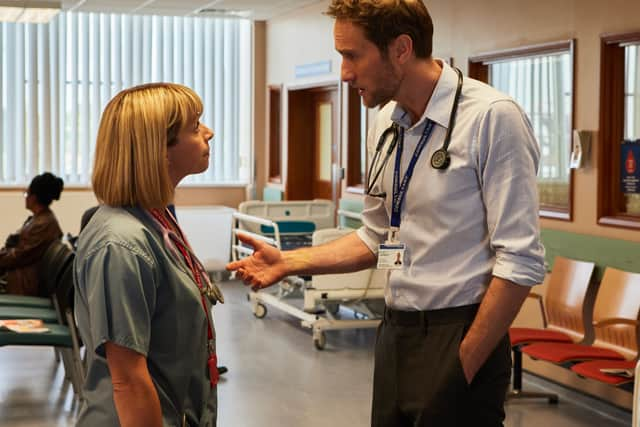Maternal review: ITV series with Parminder Nagra is a strong addition to the growing list of medical dramas


It’s a good premise for a medical drama, to start with. Medical procedurals have long been amongst the most popular television formats – just behind police procedurals and just ahead of legal procedurals – and often there’s a burden on each new attempt to try and find a fresh spin on the idea. How can something like Maternal, ITV’s new medical drama, stand out from the crowd? How can it make sure it feels meaningfully distinct from its predecessors and contemporaries, in a genre so wide it can encompass This Is Going to Hurt and Holby as easily as Call the Midwife and Bloods?
Maternal finds an effective way into the medical world again, building the series around three doctors recently returned from maternity leave. Surgeon Catherine MacDiarmid (Lara Pulver) and registrar Helen Cavendish (Lisa McGrillis) are back after a few months’ away, now navigating the demands of the medicine and their own complicated personal lives; paediatrician Maryam Afridi (Parminder Nagra), meanwhile, has been away for nearly two years after two children in a row, missing the majority of the novel coronavirus pandemic and having to adjust to a completely new world of frontline medicine. Immediately – even as the broad strokes of a medical procedural are familiar, from private moments in store cupboards to frantically performed CPR – the ITV drama has found a fresh way to frame it.
Advertisement
Hide AdAdvertisement
Hide AdIt goes beyond just a framing device, though, and Maternal is always asking what it means to be a working mother in medicine. Catherine and Helen both work closely with their partners – in one case a former partner, in another probably soon-to-be a former partner, but both in a position of seniority in part because of advances they were able to make while Catherine and Helen were on maternity leave – and Maternal is constantly drawing parallels between them. What has to be sacrificed, what falls by the wayside, what moment-to-moment victories can be achieved along the way? It is, of course, different for them both.
The strongest expression of that theme comes via Maryam (arguably the closest the show has to a main character, if only because she gets a little more focus in the opening episode, but it’s a dedicated ensemble piece otherwise). Of the three friends, she’s been away from frontline medicine longest, and her hopes for a more gradual reintegration are soon dashed – she’s quickly asked to join the on-call rota, making up for staff shortages, and soon thrown into life-or-death situations. It’s different now, though: there’s an allusion to the possibility that Maryam perhaps always felt the strain of medicine more than most, but it’s also clear now that having her own children has fundamentally changed the way she interacts with and perceives her young patients.


The performances are strong across the board – Nagra gets the ‘bigger’ scenes, anxiously second guessing herself amidst traumatic flashbacks, but Pulver and McGrillis similarly impress even in the less overtly actorly moments. Maternal’s second episode in particular is strong for them both, as Catherine is forced to reckon with delivering bad news and Helen finds herself working a little more closely with husband Guy (Oliver Chris); it’s a solid script from playwright and first-time screenwriter Jacqui Holness-Martin, who quickly demonstrates a knack for funny but naturalistic dialogue.
If there’s a flaw to Maternal, it’s that its close focus on its three leads can also, at times, feel a little narrow. It’s a series about three friends and three contemporaries, all at essentially similar positions in life – they’re all also in fairly senior positions, all fairly financially well off (look at their houses!) in a way that’s perhaps not representative of most medical staff. You can’t reasonably expect a series like this to be wholly exhaustive – hence “if there’s a flaw” – but it’s noticeable all the same, and hopefully Maternal can find space to interrogate its themes from other perspectives as it continues. (When the series concludes, Maternal will no doubt make for an interesting comparison to last year’s This Is Going to Hurt – both medical dramas that touch on similar plotlines, both tracing the intensity of the work and its impact on staff’s personal lives, both described as love letters to the NHS by their makers, each interested in divisions along different lines.)
Advertisement
Hide AdAdvertisement
Hide AdUltimately, though, Maternal is a strong addition to the growing list of medical dramas – well-acted, smartly pitched, quietly intelligent in understated ways, always watchable throughout – and well-worth your time if you’re typically a fan.
Maternal begins on ITV1 on Monday 16 January at 9pm, with the full series available as a boxset on ITVX immediately afterwards. I watched the first two of an eventual six episodes before writing this review.
Comment Guidelines
National World encourages reader discussion on our stories. User feedback, insights and back-and-forth exchanges add a rich layer of context to reporting. Please review our Community Guidelines before commenting.
